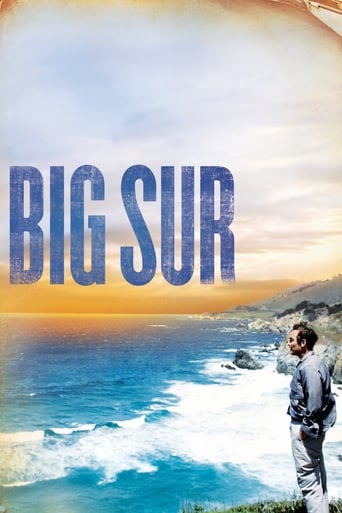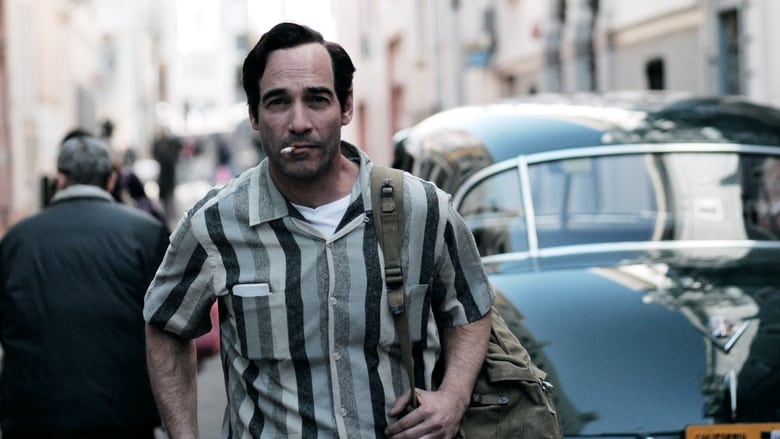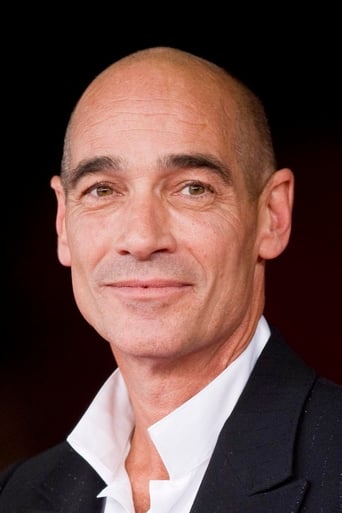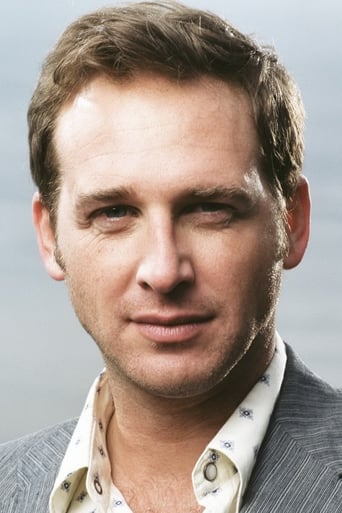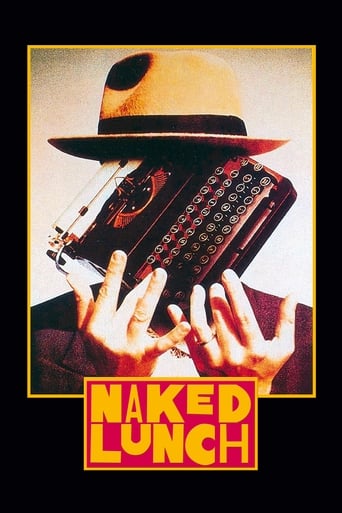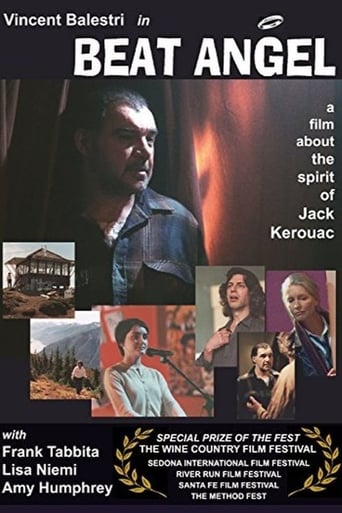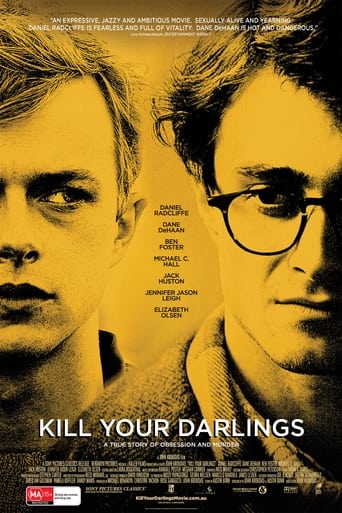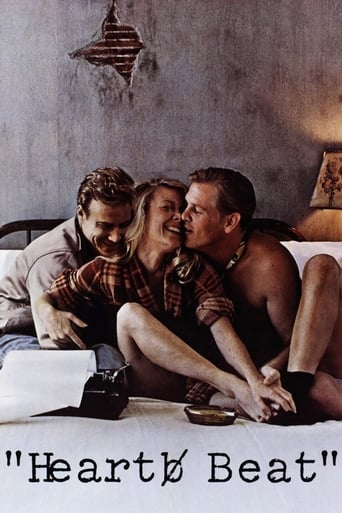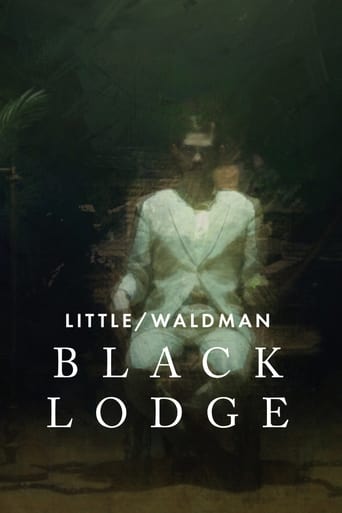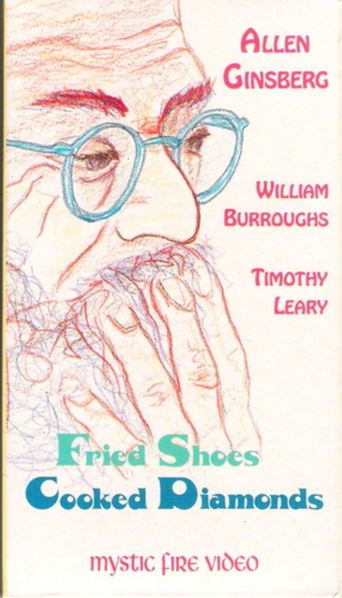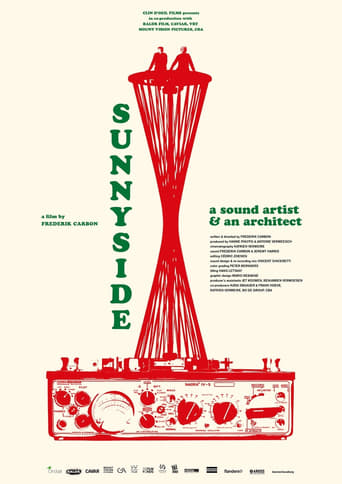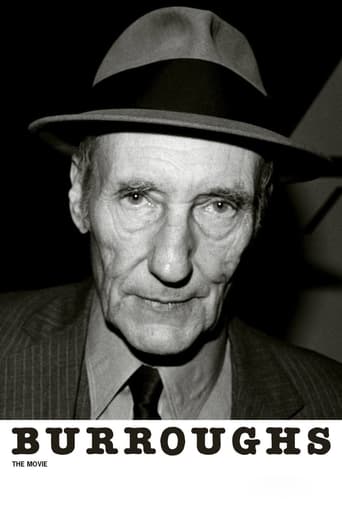Big Sur (2013)
Big Sur is a film adaptation of the Jack Kerouac autobiographical novel of the same name.
Watch Trailer
Cast


Similar titles
Reviews
Don't listen to the negative reviews
Beautiful, moving film.
If the ambition is to provide two hours of instantly forgettable, popcorn-munching escapism, it succeeds.
It’s sentimental, ridiculously long and only occasionally funny
i thought about this a lot the first time i saw this i was like was Big Sur is one of the most beautiful films ever made with greatest narration ever done in film history turns out i was wrong when i saw it the second time.sure this film had a decent cast almost everyone did a nice job but sad this is Stana Katic just got wasted here this lady is so talented her scenes are totally pointless,if you don't believe me just check her out in castle TV show with Nathon Fillion i am not going to spoil the story here but i will say that the plot & characters are depressing its good to see the acting here but film required editing at most places where it affected the pace,jack's narration gets annoying after a while most of the time he is speaking nonsense.the camera-work and cinematography just saves this drag of a film the way all the amazing scenery is captured its breathtaking.to be honest i am a sucker for slow paced & dialog oriented or novel based films i love them and enjoy them but i don't know why this one failed to click with me even though i tried it very hard to find a place in my heart for this one,Big Sur is a good film but not memorable that's my point.a lot of people and critics have different opinions about films should i have a wrong opinion about this one and say this film came at a wrong time it was 2013 seriously or it was a terrible year more negative points this get as it didn't have any big names in this films and zero marketing etc etc no way and maybe yes it possible to a certain extent but the main thing is Big Sur is simply not exiting enough to sit through.i am not saying this film is a bad one it would be unfair but its just a one time watch that's it i recommend renting it but do not buy this DVD please my rating for Big Sur 2013 is 5/10.
"Big Sur" (2013), based on the 1962 book by the enigmatic Jack Kerouac, details the author's three retreats to a friend's cabin in the magnificent eponymous location a hundred miles south of San Francisco. Sometimes he's alone and sometimes he's with friends. Kerouac can't handle his fame and success as the leader of the beatniks and so descends into the darkness of alcohol addiction. While this is a well-made artsy film featuring narrations from the author himself throughout, it's done in by its subject. At least with 1991's "The Doors," which chronicled Jim Morrison's downward spiral, we got great music, entertaining concert footage and colorful characters. "Big Sur," by contrast, only has Kerouac's stream-of-consciousness verbiage (i.e. "interior monologue") and the beautiful cinematography of Big Sur. Yes, it's professionally made with a quality cast and it kept my interest for the first 45-50 minutes, but then it just drones on to the bitter end. I hate seeing people waste their talents, especially by their own foolish addictions. Of course this is the only way the story COULD end since it's based on real life. Jack was dead at 47. Despite my criticisms, "Big Sur" is worthwhile if the topic interests you and the film's obviously a must for Kerouac fans; it will leave most everyone else bored or depressed.Interestingly, it was 1957's "On the Road" that propelled Jack to beatnik stardom, but he later confessed it "was really a story about two Catholic buddies roaming the country in search of God. And we found him." Too bad his revelation didn't help him out with his increasing substance abuse. The film runs a mere 81 minutes and was shot in Big Sur and San Francisco. GRADE: C
This is a brief review of "On the Road" and "Big Sur", two films based on novels by Jack Kerouac. In the years after World War 2, the United States saw the rise of the Beat Generation, a growing group of men and women who rejected the trends, wants, values and aspirations of the post war majority. The Beats sought spiritual meaning, rejected America's docility in the face of consumer capitalism, and were branded by many as "radicals", "dissidents" and "bums". Older generations, especially those who had struggled during the Depression, were thoroughly confused by this movement. Why did they reject work? What was wrong with them? Why did they challenge the sexual, religious and political conventions of the day? Some historians disagree about the size, influence and importance of the Beat movement, but most trace its beginnings back to 1944, when Allen Ginsberg met Jack Kerouac at Columbia University. Ginsberg would be suspended from school and Kerouac would drop out. Both would befriend the infamous William Burroughs, who at the time lived in Greenwich Village. The trio would bond with other outcasts, and spent the 1940s exploring the Village, writing poetry, novels, listening to jazz, experimenting with drugs, having uninhibited sex and waxing philosophical. Most had no steady employment. Some drifted toward Buddhism. In 1957, Norman Mailer would dub the Beats "the White Negroes". In his articles he would draw parallels between African-American and Beat lifestyles, both deemed alienated, both deemed to have deviant tastes in literature, music, language and religion. Historian Douglas T. Miller would say "the Beats made the establishment afraid because they were a genuine bunch of dissenters; they were humanitarian, attractively hedonistic, very vaguely left-wing, and most of all, popular. That gave them a dangerous power". Historian Allen Matusow would describe the Beats as "the forerunners of the Hippie Movement". Unsurprisingly, the Beats came under scrutiny of the FBI, which used McCarthyist tactics to squash what they deemed a "subversive group". At a 1960 Republican Convention, J. Edgar Hoover named "beatniks" one of the three menaces to the United States, the other two being "communism" and "intellectuals", which pretty much sums up US policy; keep em' stupid and consuming. Kerouac would publish "On the Road" in 1957. It would be turned into a 2012 film by Walter Salles. Both works find a gang of young adults on a trip across America. Their unspoken mission? To find a new, more "free" mode of living which exists thoroughly outside of contemporary conventions. More importantly, they seek to find a new way of measuring happiness and success. As such, our gang reject traditional nuclear families and form a kind of polygamous brotherhood. This project fails, as sexism, egos, macho prides and the rules and expectations of wider society (marriage, house, rent, food etc) encroach. Both works end on a note of tragedy, promises shattered and relationships broken, though Kerouac never lets go of a very specific spiritual quest: a quest to create or find something better.Salles' film is terribly directed, thin, superficial and omits the strongest aspect of Kerouac's novel: the many people his heroes encounter on the road (drunks, travellers, immigrants, workers, addicts etc), all of whom help sketch an America which pushes away as many as it embraces. The result is that Salles' film reduces the Beat movement to sex, brothels, whisky, theft and drugs. Kerouac's internal yearnings go completely ignored. Elsewhere Salles attempts to mimic the book's style (free form, fluid, rhythmical), to disastrous effect. Viggo Mortensen is excellent as an eccentric Burroughs.Worse than Salles' film is Michael Polish's "Big Sur". Like a cross between a powerpoint presentation, Terrence Malick film and sepia photo, the film stars Jean-Marc Barr as Jack Kerouac, a now famous writer who escapes his adoring public by diving into alcohol, depression and isolation. More than this, upon Kerouac's body is being inscribed the death of a generation. He sees dead animals everywhere (cats, otters, rats etc), finds the sound of crashing waves to be death kneels, and is consumed by a hatred for absolutely everything, unable to find joy or pleasure in a world that has long given up on his own personal ideals. In "Big Sur", Kerouac – the voice of a generation - has long died, his body is just taking a while to catch up. While Kerouac may be a sign-post in American literature, as cinema "Big Sur" and "On the Road" are thoroughly outdated. Why? Largely because American cinema had its own Kerouac: Nicholas Ray. As comparison, see Ray's "In a Lonely Place", "On Dangerous Ground", "Knock on Any Door", "Rebel Without a Cause" and "Bigger than Life". Vincente Minnelli also traded in similar themes ("Some Came Running", "The Sandpiper"). Also of interest are 1967's "Easy Rider" and the existential road movie of the 1970s ("Vanishing Point", "Two Lane Backtop" etc), and even more recent films like "Ghost World", "Ask the Dust", "Where the Buffalo Roam" (1980), "Fear and Loathing in Las Vegas" and "The Rum Diary", all films about writers on similar existential quests. 4/10 - Worth one viewing.
Squeezed between the Heroic "Greatest Generation," who conquered the Great Depression, won WWII, and produced seven American Presidents, and the Baby Boomers, who've churned out three U.S. Presidents so far, as well as a million celebrities too numerous to itemize here, was The Beatnik Generation (also known as the Beaten Down Folks) of this movie, BIG SUR. This group, born from 1928 through 1945, produced NO American Presidents (unless you count Puppetmaster Dick Cheney), and has managed little else but a bisexual circle of personalities largely unknown to normal Americans, but obsessed with having movies made about their alleged "heyday" (HOWL, ON THE ROAD, KILL YOUR DARLINGS, and BIG SUR are only four of the most recent). When the surviving "Beats" serve as "technical consultants," their booze and drug-addled brains apparently are not lucid enough to get the main characters--all of whom hung around together--into the same flick. In addition to "notables" featured in BIG SUR--Jack Kerouac, Neal Cassady, and Michael McClure--there was a handful of others, such as Allen Ginsberg, homophobic killer Lucian Carr, Ken Kesey, Tom Wolfe, and Hunter S. Thompson (the latter of whom both George McGovern and Jimmy Carter credit for their Democratic presidential nominations in GONZO: THE LIFE AND WORK OF DR. HUNTER S. THOMPSON). BIG SUR drops most of the pseudonyms utilized by Kerouac for these people in his actual books (as only university English majors hell-bent in staying out of the "real world" the rest of their lives have even heard of the fake names) in favor of their real names, except it calls Diane and Curtis Hansen "Billie and her son Elliott," in an attempt to further "smooth over" the bigamy of the circle's one Alpha Male, Neal Cassady. If I haven't said enough already for you to decide whether or not to see BIG SUR, let me conclude by saying there was ONE other person at my showing in the theater, and he WALKED OUT (never to come back) after 40 minutes of this mercifully brief 81-minute effort to make a silk purse out of a sow's ear of a generation (but the scenery is absolutely stunning!).

